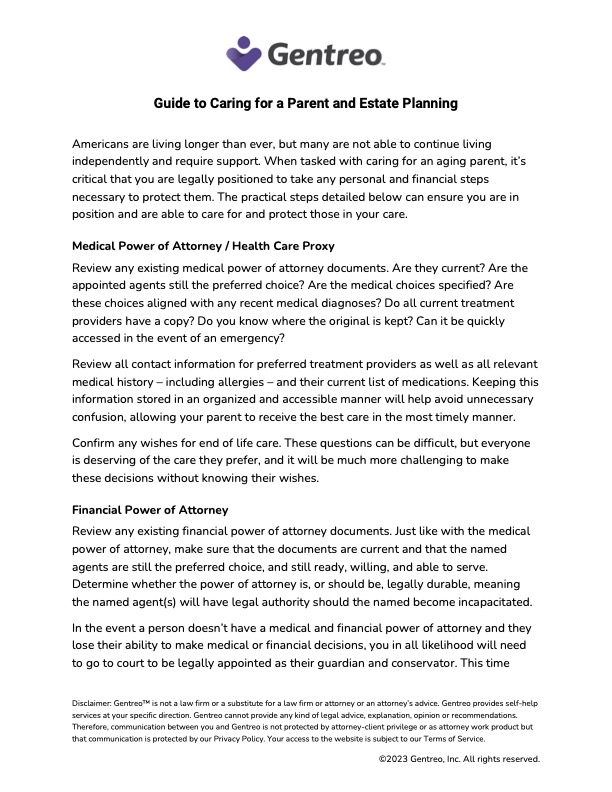The Ultimate Guide: Caring for a Parent
Americans are living longer than ever, but many are not able to continue living independently and require support. When tasked with caring for an aging parent, it’s critical that you are legally positioned to take any personal and financial steps necessary to protect them. The practical steps detailed below can ensure you are in position and are able to care for and protect those in your care.
Get the FREE Guide!
Enter your email address to download our FREE guide that covers the things you need to do to protect your parent and their interests as they get older and may need more support and care.

Step 1: Medical Power of Attorney / Health Care Proxy
Review any existing medical power of attorney documents. Are they current? Are the appointed agents still the preferred choice? Are the medical choices specified? Are these choices aligned with any recent medical diagnoses? Do all current treatment providers have a copy? Do you know where the original is kept? Can it be quickly accessed in the event of an emergency?
Review all contact information for preferred treatment providers as well as all relevant medical history – including allergies – and their current list of medications. Keeping this information stored in an organized and accessible manner will help avoid unnecessary confusion, allowing your parent to receive the best care in the most timely manner.
Confirm any wishes for end of life care. These questions can be difficult, but everyone is deserving of the care they prefer, and it will be much more challenging to make these decisions without knowing their wishes.
Step 2: Financial Power of Attorney
Review any existing financial power of attorney documents. Just like with the medical power of attorney, make sure that the documents are current and that the named agents are still the preferred choice, and still ready, willing, and able to serve. Determine whether the power of attorney is, or should be, legally durable, meaning the named agent(s) will have legal authority should the named become incapacitated.
In the event a person doesn’t have a medical and financial power of attorney and they lose their ability to make medical or financial decisions, you in all likelihood will need to go to court to be legally appointed as their guardian and conservator. This time consuming process emphasizes why it’s critical to have these conversations now and verify that any estate planning documents are up-to-date.
Conduct a thorough financial review. The financial power of attorney should have a comprehensive understanding of assets and obligations to be in position to act on the person’s behalf. As part of this financial inventory, review any current life insurance and/or burial insurance policies, including how to access them and review or update the named beneficiary.
Backup Planning
Good planning hopes for the best and plans for the worst. Incorporating a backup plan ensures there are no disruptions in the care your parent receives should something happen to you and you can no longer meet their care needs. Make sure the alternate care providers know how to access all the necessary information and documents to guarantee your parent’s choices will be protected.
Checklist
- Does your parent have an updated medical and financial power of attorney?
- Do they have an updated will and/or trust?
- Do you know where these documents are stored? Can you quickly access them in an emergency?
- Do you have all of their preferred treatment providers’ contact information?
- Do you have a clear picture of your parent’s finances, including any additional insurance policies?
- Do you have backup for their care in case something happens to you?
